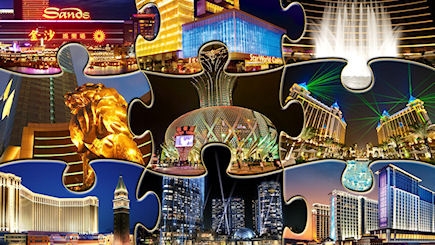This article first appeared in the Jul/Aug 2013 issue of World Gaming magazine.
Keeping up with the growth of Macau is nearly a full time job in itself. During the four years we have been covering the world of gaming in Macau we have seen numerous changes and amazing growth on so many levels. Macau continues to define itself as the epicenter of global gaming. Galaxy Macau is now well and truly bedded down and Sands Cotai Central has been here for over a year. We now look forward to 2015 when the next wave of property openings will begin. What better time than now to examine just how far we have come since 2009?

The cover story of the first ever issue of World Gaming was written in mid 2009 and was entitled “Macau takes top spot as Vegas loses its way“. How things have changed in just four years. Back then our argument was that Macau had taken the ascendency from Las Vegas as the globe’s gaming mecca. This assertion was still debated by some despite statistics noting the remarkable growth of this unique Chinese region since the liberalization of the casino industry led to the opening of the first non-SJM casinos in 2004. There is no argument now – as of the end of 2012 Macau’s annual gaming revenue had surged to six times that of the Las Vegas strip. If the once glitzy Nevada city had been handed a standing eight count back in 2009, Macau has since delivered the knockout blow and then some! Macau’s isn’t a thing of the future. It’s here right now.
A LOOK AT THE NUMBERS
At the time we were making preparations for WGM’s first issue, Macau’s annual visitation was around 22 million. Right now, it stands closer to 28 million and rising.

It was 2006 when Macau’s annual gaming revenue hit US$7 billion and officially overtook that of Las Vegas. In 2009 that figure had grown to almost US$15 billion. Now it stands at a whopping US$38 billion and is expected to surpass US$100 billion by 2020. In April 2002 Macau had just 11 casinos, all of which operated under SJM’s license. By the end of 2009, there were 33 casinos on the books. With the opening of Galaxy Macau in 2011 and Sands Cotai Central last year, this number now stands at 35, of which 32 are currently operating. The two new openings over the last two years turned World Gaming’s so-called BIG7 into a BIG9.
|
THE WGM BIG9 – HERE RIGHT NOW
|
|||
|---|---|---|---|
|
Concessionaire
|
Casino(s)
|
||
|
Galaxy
|
Galaxy Macau |
||
|
Melco Crown
|
|||
|
MGM
|
|||
|
Sands China
|
|||
| SJM | Grand Lisboa | ||
| Wynn | Wynn Macau | ||
Revenue growth shows no sign of slowing down. The first quarter of 2013 saw revenue of US$10.7 billion, up 15 percent on the US$9.3 billion for the same quarter last year.
Compare this to Las Vegas, which posted revenue growth of a mere 1.5 percent in 2012 and lags well behind Macau at US$6.2 billion a year in total revenue. The entire state of Nevada collected US$10.8 billion in 2012, the same amount Macau made in just the first quarter this year. At US$38 billion, Macau’s 32 operating casinos now generate slightly more revenue than the hundreds of properties that comprise the entire United States casino industry, excluding Indian reservation gaming, which is worth a further US$27 billion a year. I don’t think it will be too many years before Macau will even eclipse the entire US market including Indian reservation gaming.

In the sense of Macau’s ultimate potential, we still have a long way to go. But in terms of revenue, Macau has already arrived and holds the undisputed title of the world’s biggest gaming center. No other city on the planet even comes close. Macau is here, right now.
EXPANSION SINCE 2009
It would be hard to argue against the statement that the most significant change to the landscape in Macau over the past few years has been the opening of Galaxy Macau. All I can say is, “Wow!” What an addition this property has been. I’m often accused of favoring Galaxy and talking it up. I stand guilty as charged – because in my opinion it is the best property in Macau so far, and has the greatest potential for the future. This property has earned my respect. There was a time around 2008 and 2009 when we were all wondering if Galaxy was ever going to happen, but it seems it was well and truly worth the wait.
Sands China Ltd (SCL) is the other huge player that has arguably contributed the most to the “new Macau”. After some struggles in its early days with a very American style in a very Chinese environment, SCL has learned valuable lessons about how to do business in this part of the world. Credit must be given where credit is due – SCL is a cash machine right now, sitting handsomely in a competitive market. The company has done more to boost the number of beds on offer in Macau than any other and now boasts four world class properties in the Venetian, Sands Macau, the Plaza and now Sands Cotai Central, which opened in April last year.

Let’s not forget the four other concessionaires. Wynn has managed to establish its brand as one synonymous with high-end luxury, but has lost some of its luster lately with the endless bad press it has received over Steve Wynn’s acrimonious and bitter split with Japanese pachinko king Kazuo Okada. Wynn has taken the split personally and his Chinese hosts don’t like this dirty laundry being aired in public. A number of other scandals have also rocked the former golden child of the three American gaming brands in Macau.
SJM with its decades-old “Lisboa” brand name, lotus-shaped BIG9 property Grand Lisboa and long-established stable of older hard-core Chinese properties firmly sits as the most “Chinese” brand of the six concessionaires. Some of SJM’s smaller second-tier properties are posting extraordinary numbers. SJM retains a firm grip on Macau’s coveted number-one-market-share position. Say what you like about SJM, you have to respect their history and current position in the marketplace.
MGM, always hamstrung by a shortage of hotel rooms, has positioned itself as the “boutique” property, and has performed particularly well in the burgeoning Macau slot machine market. Construction of their new property in Cotai is underway and the success or otherwise of this property will make or break the MGM brand name in Macau.

To be honest I am still waiting for Melco Crown and its COD flagship to impress me. In fairness, COD does have the excellent House of Dancing Water show and has lifted its game a little recently, but it could be argued that a rising tide lifts all boats. Melco Crown’s real chance to shine is with the much-maligned Macao Studio City project. The cranes are on the site as we speak and if Melco Crown can resurrect this project and get it open at the five-star international standard we’ve come to expect from new Macau casinos, I’ll gladly sing their praises.
MACAU: NOT JUST A GAMING DESTINATION
It would be easy for the big casino operators in Macau to rest on their laurels given the huge success of their gaming operations, yet even in the non-gaming field they continue to make steady inroads into what was once the sole domain of the Americans. In Las Vegas, the move towards turning properties into diverse holiday resorts was one borne out of necessity – gaming numbers were down and there was such intense competition for revenue properties tried anything they could to attract patrons their way.
Macau hasn’t seen the same need to lure people with outside attractions yet this hasn’t stopped the big casinos working tirelessly to improve their services and setting up infrastructure to compete for new and returning visitors to Macau. The Macau government, to its credit, supports non-gaming initiatives and this is crucial to the long term future of Macau as not just the world’s gaming mecca but a leader in international tourism.
Over the last four years we have seen an incredible array of entertainment and events brought to Macau. SJM does a great job in continuing to support the Macau Grand Prix and the race will celebrate its 60th anniversary this year. We have seen boxing come to Macau with Chinese future superstar and two time Olympic gold medalist Zou Shiming making his professional debut at the Venetian in April. The powers that be in arguably the world’s fastest growing sport, Mixed Martial Arts (MMA), clearly see a future in Macau as demonstrated by recently holding the first-ever sanctioned UFC card in Macau. It won’t be long before Macau will be a genuine competitor to Las Vegas as host of the most prestigious fights in the world.
Earlier this year Sands China Ltd signed an agreement with DreamWorks Animation that will see guests and visitors to Sands Cotai Central and the Venetian interact with characters from popular family films such as Shrek, Madagascar and Kung Fu Panda. Once the domain of family destinations like Disneyland, the SCL-DreamWorks partnership will see generations of kids recalling their unique experiences in Macau. This is a shrewd long-term move by SCL and is to be applauded.
The House of Dancing Water at City of Dreams provides a Vegas-standard show five nights a week while the list of international artists coming to Macau is incredible. The younger crowd is regularly entertained by the best DJs the world has to offer and for the older set we’ve already seen The Beach Boys and Elton John perform in the past six months. More and more big name Chinese superstars are seeing Macau as an essential stop on their tour schedules.
COTAI’S UNLIMITED POTENTIAL
I have lived in this part of the world for eight years and clearly remember when Cotai was little more than a fancy dream. Cotai looked more like a wasteland than a gaming hub and even after the Venetian opened, the iconic property stood out like a sore thumb. It was as if someone had transplanted a monolithic skyscraper onto the moon!

Cotai desperately needed critical mass but now with Galaxy Macau, City of Dreams (COD), the Plaza and Sands Cotai Central (SCC) joining the Venetian, Cotai has quickly fulfilled its initial potential, with much more yet to come. Right now, Macau can genuinely claim two separate gaming and entertainment hubs. Whether you call it “Macau side”, “the peninsular” or “old Macau”, that side represents the traditional casino zone, and Cotai represents the new “mega resort” future of this wonderful city.
Cotai continues on its merry way with effectively six new properties in various stages of construction or planning. Each of the six concessionaires is racing to bring their latest offering to the Cotai landscape. The planned properties are Galaxy phase 2 which will connect seamlessly with Galaxy phase 1, SCL’s Parisian just south of the Plaza, MGM Cotai and Wynn Cotai both to the east of the existing Cotai properties, Macao Studio City south of the Parisian and SJM Cotai which seems set to be built to the east of the Macau East Asian Games Dome.
“ONE COUNTRY, TWO SYSTEMS” WORKING PERFECTLY
The world collectively held its breath when sovereignty over Hong Kong and Macau were handed back to China in 1997 and 1999 respectively. As it turns out there was never anything to worry about and the first 10-plus years of “One Country, Two Systems” has come and gone with China, Hong Kong and Macau all prospering. After the first decade of “One Country, Two Systems”, the swearing in of the second Chief Executive of Macau has continued to show the commitment by all parties to maintain the status quo. Any fear that this was not going to work has now well and truly evaporated. The system is working, right now.

Mainland China wants to support and nurture its two Special Administrative Regions (Hong Kong and Macau) both as shop fronts to the world and as shining examples of what Taiwan could become if she ever came into the fold. This ongoing commitment to “One country, Two systems” will see Macau continue to prosper and grow with an increased amount of local and foreign tourism and investment.
THE THREAT THAT NEVER WAS
When you see a success story like Macau, it’s a safe bet others will follow and try their best to replicate that success. This has happened throughout the Asia-Pacific region and even though the others have enjoyed success they haven’t even made a ripple in Macau’s waters.
Perceived “threats” from Singapore and Manila have passed with Macau continuing its upward surge. Singapore is even neck-and-neck with Las Vegas for the title of “second biggest gaming market in the world”, but Singapore still doesn’t cannibalize Macau’s market in any way. When the second-best at something is simply no threat whatsoever to the best, you know the best will be staying on top for a very long time to come.
There have also been a large number of smaller gaming operations opening in expansion markets such as Cambodia, Vietnam and Laos but again their impact on Macau has been non-existent. New markets in Taiwan, Japan and Korea will probably follow suit eventually but again I can’t see any of the heavy-hitters in Macau losing any sleep. They know their product is safe. If anything, it appears the expansion of gaming across Asia has simply seen the pie increase for all. A good analogy is the 1980s emergence of the home video recorder, which was famously heralded as the death of cinema. In fact, home video led to a re-invigoration of the movie industry as a whole. In a similar fashion, I believe emerging gaming markets are no threat whatsoever and eventually will benefit Macau by further normalizing casino gaming and acting as “training grounds” for the bright lights of our fair city.
HENGQIN ISLAND
Many people think of Hengqin Island as a part of Macau’s future, but don’t underestimate the value it is already bringing to Macau, right now. The island, part of Zhuhai in mainland China, was once considered a wasteland. But it has the strategic benefit of being a mere stone’s throw to the west of Cotai. Three times the size of the entire Macau SAR, in the years and decades to come Hengqin will provide a much needed easing of the pressure on Macau’s infrastructure. In the long term Hengqin is expected to house 20,000 hotel rooms not to mention the Chimelong Ocean Resort theme park which is touted as an attraction that will turn Hengqin into “China’s Orlando”, bringing yet more millions of visitors annually to the region.

Right now, there are already more than 20 major development projects underway at Hengqin, representing an investment of well over RMB 100 billion (US$16 billion), and property prices on the island are skyrocketing. Right now, the University of Macau has a brand new one square kilometer campus on Hengqin which is accessed via a tunnel from Macau. It is 10 times the size of their previous campus at Taipa. No immigration is required to access the campus and it is governed by the law of the Macau SAR, not of mainland China.
WHAT TO EXPECT IN THE FUTURE
More of the same. It’s boom time in Macau and there is plenty of gold left to mine. Macau will continue to offer what it offers and will continue to do it well as the number of people filing into Macau keeps surging upwards. But it is impossible to have such extensive growth and expansion without new issues and new challenges arising. From a gaming perspective, there are a number of key issues that continue to dominate discussion in the industry. Let’s take a look at them.
DESPERATELY NEEDED INFRASTRUCTURE
As China continues its unstoppable rise to being the next global superpower, the concomitant rise of China’s middle class continues to increase the demand for fast and efficient travel to Macau. Right now there are 150 million Chinese considered to be part of the global middle class. By 2020 this figure will hit anywhere from 300 to 500 million depending on who you believe, and, incredibly, pundits are tipping by 2030 it will surpass a billion – around 70 percent of China’s entire population. Macau’s ferries, international flights and border crossings are already at saturation point and the need to expand these services is pressing. Three significant improvements are on the way:
Hong Kong-Zhuhai-Macau Bridge
Construction on this remarkable 50km link between the three major cities on the Pearl River Delta is already well underway. With an estimated cost of over US$10 billion, it will significantly ease ferry terminal congestion and provide a huge boost to tourism in the region when it opens in 2016.
Macau Light Rail
Due to be completed in 2015, this ambitious project will provide a transit service between Macau Peninsula, Taipa and Cotai. It will service key entry points such as the Border Gate, the Macau-side Ferry Terminal, the Lotus Bridge border crossing, Macau airport and the Taipa ferry terminal.
Second border gate at Gongbei
A second border crossing between Macau and Zhuhai at Gongbei is planned. Aimed at easing the flow of people through the existing highly congested Gongbei border gate, the new border post will be able to process 200,000 crossings daily while the expansion of the current Border Gate will boost its capacity from 300,000 to 500,000 crossings daily.
TABLE CAP
The Macau table cap started last year at 5,500 tables and in theory was meant to increase by 3 percent annually for 10 years.
This year was the very first year of increase and we’ve already deviated from the plan, with the Macau Government approving 250 new tables instead of the 165-table increase that a 3 percent increase on 5,500 tables would imply. The government said its hand was forced by prior promises to the operators and it now considers the 3 percent increase a number to adhere to on average over the 10 years.
The casino operators have shot the 3 percent number down as nowhere near enough to keep up with growth. Each of the six new Cotai properties are going to need a bare minimum of 400 tables to survive, and a good many of them have announced they will have more than that. Beyond the six new properties there’s also the Louis XIII property, another rumored property on the Macau side, most likely additional properties on land parcels 7 and 8 on the Cotai Strip and of course Galaxy phases 3 and 4. They will all be asking for tables. Even if every property only gets around 80 percent of the tables they would like in a perfect world, the Macau landscape seems set to consist of around 8,500 tables by 2018.
Expect plenty more creative accounting, averaging arguments and “reluctant” grandfathering to justify these extra tables over the next five years.
LABOR SHORTAGE
Macau’s unemployment rate has held steady at an incredibly low 1.9 percent for quite some time. The government should be congratulated on this remarkable achievement, but much of that is a result of the considerable restrictions the government has placed on hiring people from outside Macau. But with so few people now looking for work, this makes it difficult for casino operators to find staff to fill positions as they continue to grow. It is also driving up wages as operators fight it out to lure dealers and other skilled workers to their properties.

The government is to be commended for quietly allowing the number of foreign workers in Macau to increase in recent years, but unless they relax the restrictions dramatically by making some fundamental changes, the problem is only going to get worse. The obvious change to make is to allow workers from Guangdong Province to work in a small percentage of entry-level positions in Macau, allowing Macau locals to be promoted to higher positions.
ACCOMMODATION SHORTAGE
Despite SCL’s sterling efforts in getting hotel rooms open, one of the greatest challenges facing the gaming industry in Macau right now is the struggle to meet the demand for accommodation over the busy weekend period. The total number of hotel rooms in 2008 was just 17,490. That has now increased to 27,961 in mid 2013, but weekend occupancy rates remain at 100 percent, driving prices too high. Phases 2, 3 and 4 of Galaxy Macau’s expansion, which will supply another 6,800 hotel rooms, can’t come soon enough.
WILL IT EVER END?
At some stage in the distant future the market will even out with supply finally matching demand, but I may be a very old man by then. Competition between the properties will hot up over the years as the market matures and that means the casinos will start to offer even better incentives and services to keep existing players and attract new ones. But will we ever see a declining trend in Macau’s gaming market? The short answer is, no. Well, ok, maybe in 40 or 50 years. For the next 20 or 30 years, all I can see is growth. The future does indeed belong to Macau, as well as it already being here right now.
It will be interesting to see what changes have taken place when we revisit this story in a few years’ time. If the past four years are anything to go by, there are some very exciting times ahead!







